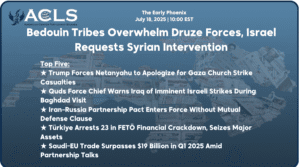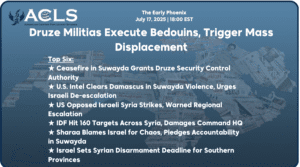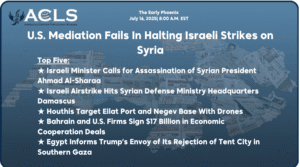Iran Expands Its Influence, Turkey Intensifies Military Operations, Egypt Faces Challenges in Containing the Houthis, and Stability of the Israeli Government Hangs in the Balance
By: Rania Kisar
★ Iran’s Regional War: An Assessment of Four Fronts
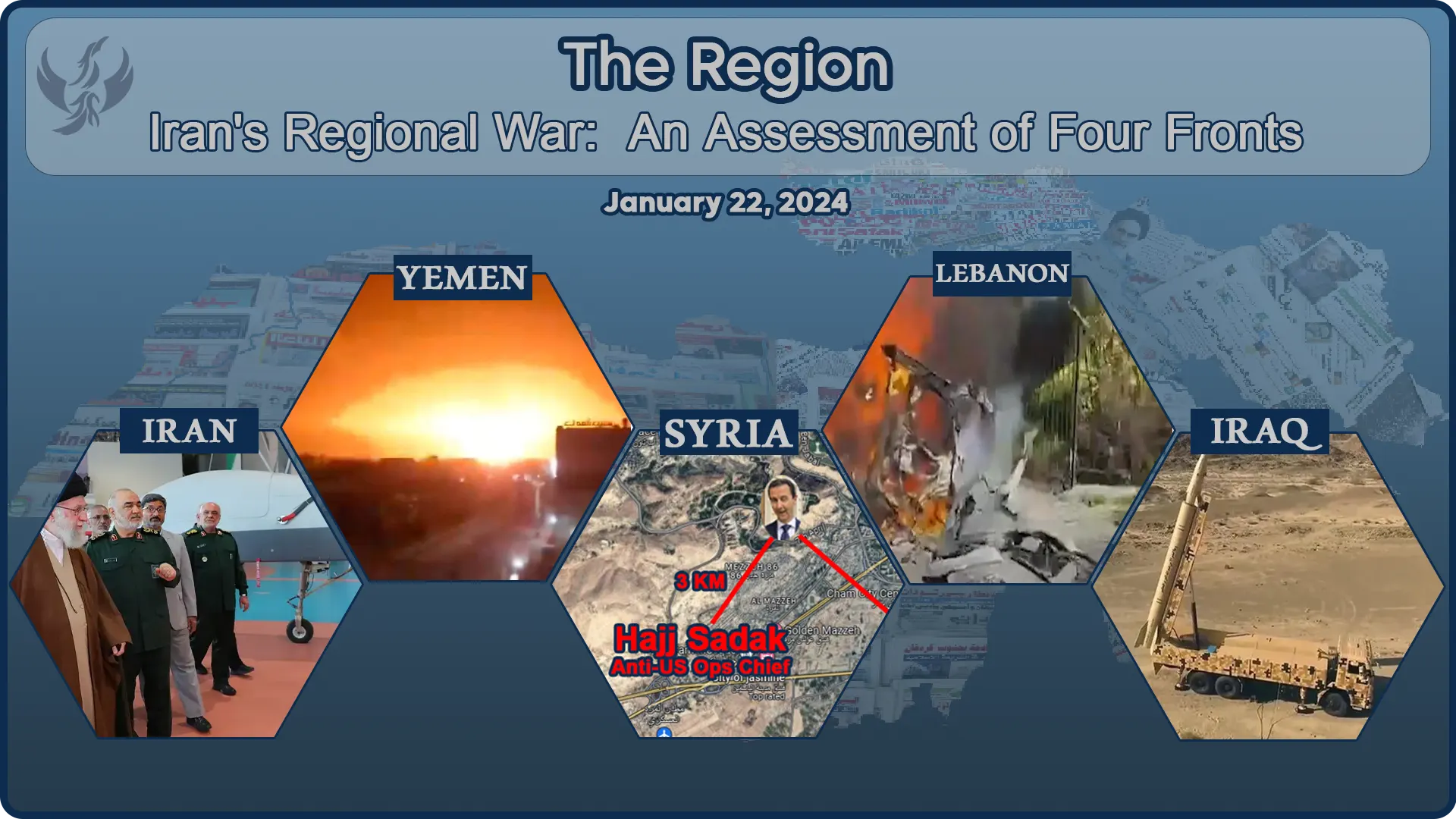 Iran is striving to assert its influence in the Middle East, especially against the United States and Israel, without engaging in direct conflict. These efforts are showing a lack of effectiveness in Yemen, Syria, and Lebanon, where Iran faces increasing strategic challenges and pressures, the effects of which are becoming rapidly apparent. Conversely, the situation in Iraq is different; Iran is making notable progress, benefiting from the United States’ military restraint and diplomatic approach. The general trend indicates a decline in Iranian effectiveness in fronts requiring strong resolve and determination, while continuing to strengthen its position in Iraq, which remains under the influence of American policies.
Iran is striving to assert its influence in the Middle East, especially against the United States and Israel, without engaging in direct conflict. These efforts are showing a lack of effectiveness in Yemen, Syria, and Lebanon, where Iran faces increasing strategic challenges and pressures, the effects of which are becoming rapidly apparent. Conversely, the situation in Iraq is different; Iran is making notable progress, benefiting from the United States’ military restraint and diplomatic approach. The general trend indicates a decline in Iranian effectiveness in fronts requiring strong resolve and determination, while continuing to strengthen its position in Iraq, which remains under the influence of American policies.
★ Yemen Front
Despite direct involvement by IRGC and Lebanese Hezbollah leaders in Yemen, providing intelligence and coordinating Yemeni Houthi attacks against Israel-bound ships, their efforts have not yielded significant success. In a display of restrained power, targeted British and American airstrikes on Houthi facilities led to the deaths of 75 individuals, among them members of the Iranian Revolutionary Guard and Lebanese Hezbollah. The airstrikes also resulted in the destruction of missile platforms and drone depots, effectively thwarting planned Houthi operations that posed a threat to international shipping.
★ Syria Front
Iran faced its greatest setback this week in Syria after precise Israeli strikes took the lives of five top IRGC leaders. The IRGC confirmed the loss of significant members of the Quds Force’s elite, including the prominent intelligence figure, Hajj Sadak, who is known as the key architect behind operations countering American presence and orchestrating Iran’s logistical and security strategies in Syria. This ranks him higher than Sayyed Razi Mousavi, who was killed in a previous strike in December. Bashar Assad finds himself in an increasingly precarious position, facing threats from both Iran and Israel. Accusations from Iranian officials suggest espionage within the Assad regime, implying a betrayal that Iran is unlikely to overlook. Concurrently, the Israeli military demonstrates a resolute commitment to eradicating Iranian influence in Syria. This dual pressure places Assad in a critical situation, where his personal safety and political standing are jeopardized by the escalating tensions and suspicions from both neighboring powers. To understand more about the crosshairs Assad is caught in, watch this one minute video: Iranian Influence in Syria Under Siege: High-Level IRGC Figures Eliminated, Threaten Assad’s Regime.
★ Lebanon Front
The recent escalations between Hezbollah and Israel, which extend beyond mere skirmishes, highlight a significant asymmetry in the conflict. This was particularly evident in the Israeli drone strike that occurred this weekend in the Bint Jbeil district. The strike targeted the lead car of a convoy, believed to be transporting a senior Hezbollah commander according to a report by The Jerusalem Post. This action underscores Israel’s formidable intelligence capabilities and strategic boldness in targeting key Hezbollah figures.
The ineffectiveness of Hezbollah’s response, a purported strike on the Galilee region on Monday morning which Israeli media later confirmed hit an uninhabited area, is starkly juxtaposed against Israel’s decisive countermeasures. Following the elimination of a top Hezbollah officer, Sunday night saw the Israeli Air Force and IDF tanks executing two comprehensive waves of strikes, dismantling a military compound, outposts, and launch sites across southern Lebanon.
In conclusion, these events decisively affirm Israel’s superiority in intelligence and military power, enabling it to freely target crucial elements within Hezbollah. Israel’s strategic and robust military operations overshadow Hezbollah’s symbolic responses of retaliation, highlighting Hezbollah’s operational limitations and strategic inadequacies in the face of the immense and sophisticated might of the Israeli military. Compared to it, Hezbollah, as an unrecognized faction, is considered a significant obstacle to the security and development of its own country.
★ Iraq Front
Following Iran’s use of “Khaibar Shekan” missiles and drones in Erbil on January 16th, Iraqi officials quickly responded, focusing on refuting Iran’s claims about the presence of Israeli Mossad spy centers in the targeted area. This defensive response, rather than a clear condemnation of the attack, indicates a concerning dynamic. The subsequent formal condemnations and the complaint to the United Nations seemed more like face-saving measures than genuine efforts to address Iran’s military actions, suggesting either an implicit agreement with the Iranian narrative or a notable weakness in Iraq’s stance against violations of its sovereignty.
As a result, Iraq continues to experience additional aggression from Iranian-backed militias. On January 18, the Kurdistan Region’s Counter-Terrorism Service in Iraq intercepted three drones that were aimed at Erbil Airport. This airport is of great significance as it accommodates both American and international forces. Iran continued to escalate on January 20, with Iranian-backed militias launching a series of ballistic missiles and rockets at Al-Asad Airbase in Western Iraq, targeting American forces stationed there.
While Iran’s aggressive actions in Yemen, Syria, and Lebanon have been met with stern responses that have deterred further escalation, the situation in Iraq presents a stark contrast. Here, Iran continues to gain ground, benefiting from a combination of American military restraint and diplomatic initiatives.
=====================
★ ISRAEL
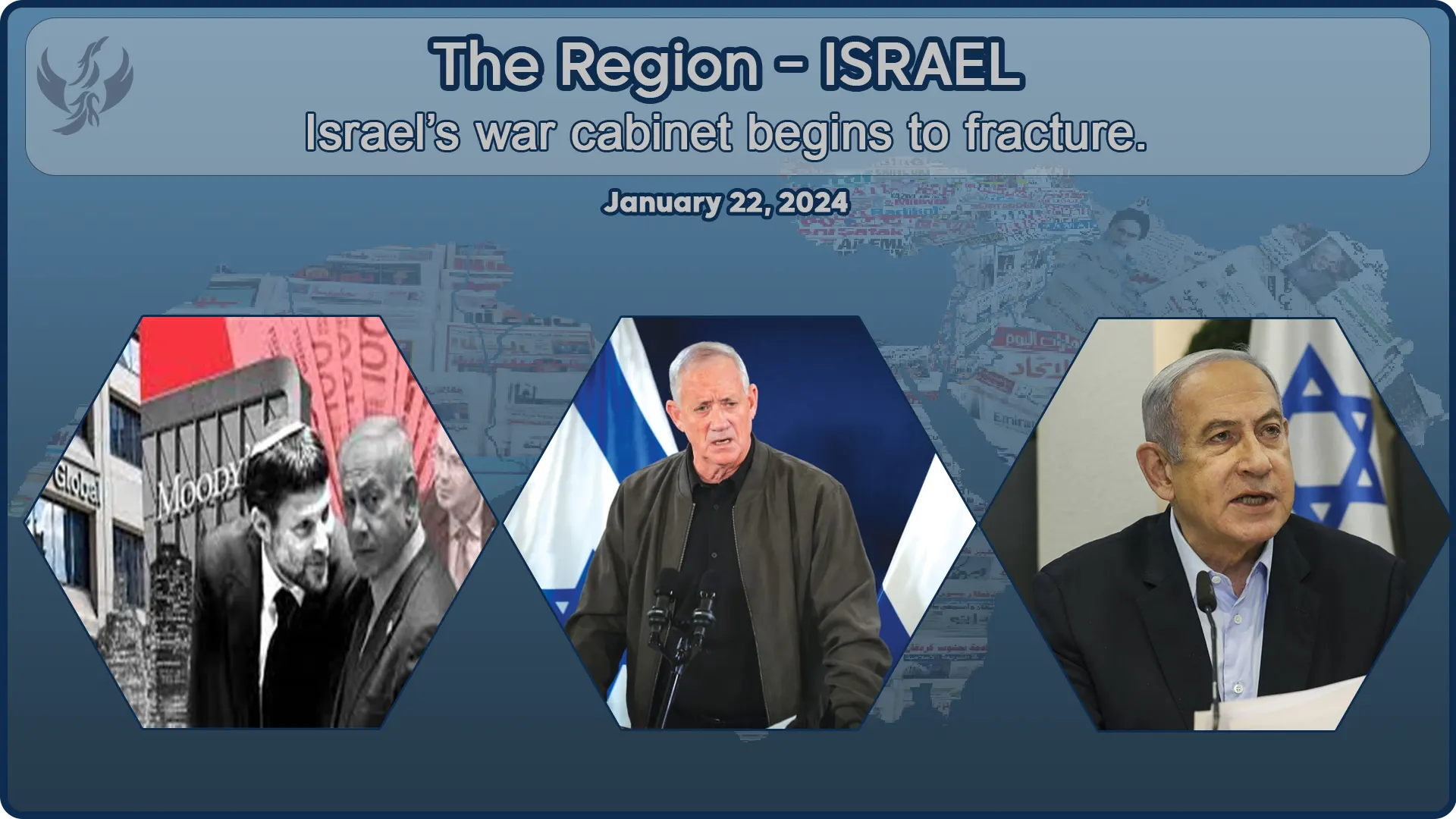 Israel’s war cabinet begins to fracture. With the Israeli military campaign in Gaza lasting longer than Israelis had hoped, and with the costs of the war economy and of large-scale military mobilization mounting, the fractures within the country’s war cabinet are beginning to publicly show. Pressure is mounting in particular on opposition leader Benny Gantz and his Knesset bloc to break from PM Netanyahu’s war cabinet–of which Gantz is a member–and push for near-term elections. According to polling of Israelis, new elections would result in a resounding defeat for Netanyahu and his governing coalition. Netanyahu could also face an internal leadership challenge within his coalition from defense minister Yoav Gallant.
Israel’s war cabinet begins to fracture. With the Israeli military campaign in Gaza lasting longer than Israelis had hoped, and with the costs of the war economy and of large-scale military mobilization mounting, the fractures within the country’s war cabinet are beginning to publicly show. Pressure is mounting in particular on opposition leader Benny Gantz and his Knesset bloc to break from PM Netanyahu’s war cabinet–of which Gantz is a member–and push for near-term elections. According to polling of Israelis, new elections would result in a resounding defeat for Netanyahu and his governing coalition. Netanyahu could also face an internal leadership challenge within his coalition from defense minister Yoav Gallant.
Netanyahu is therefore trying to lead a war effort while fighting for his political life. Against that backdrop, he announced on Sunday that Israel rejected Hamas’ conditions for the release of detainees in Gaza. The Israelis said in exchange for the hostages’ release, Hamas demanded a withdrawal of all Israeli forces from the Gaza strip and cessation of war. Some observers outside Israel claimed that Netanyahu is purposely trying to extend the military campaign so as to hold onto power, but this ascribes to Netanyahu more control over events that he actually has. In reality, a large majority of Israelis do not want Netanyahu to remain in office but support continuing the war as the best means of bringing Israeli hostages home and ending the threat Hamas poses. The IDF offensive in Gaza is therefore not a Netanyahu-driven campaign, and likely to continue regardless of the prime minister’s political fortunes.
=====================
★ TURKIYE
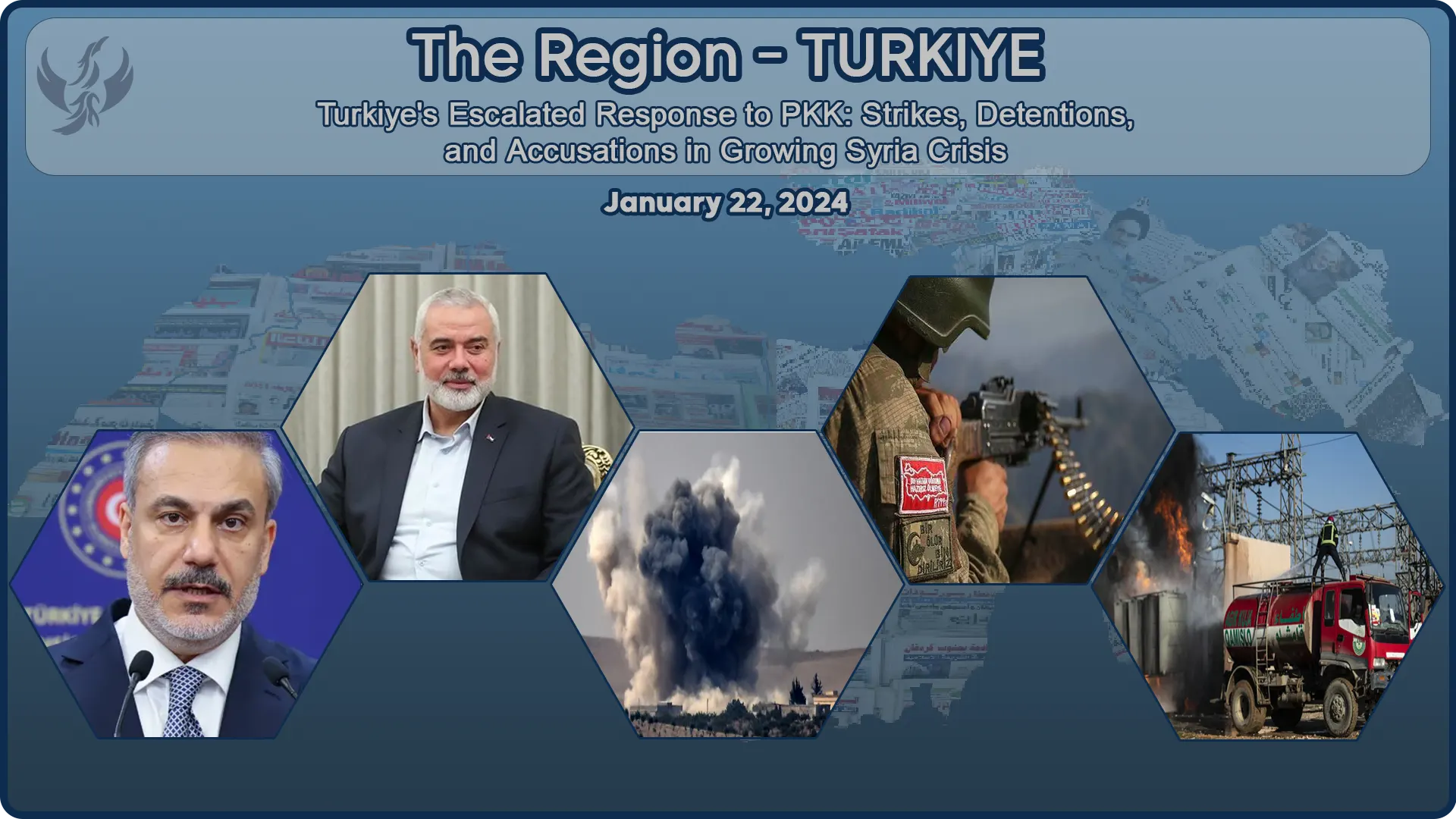 Turkiye and the Gaza Crisis. Without specifying the location of the meeting, Ismail Haniyeh visited Turkiye this Saturday shortly before foreign affairs minister boarded the plane to come to New York to attend a United Nations Security council meeting on Gaza. The sources explained that the talks held by Haniyeh dealt with the “release” of detainees in the Gaza Strip , noting that the last talks between Haniyeh and Fidan dated back to last October 16 and took place via telephone call.
Turkiye and the Gaza Crisis. Without specifying the location of the meeting, Ismail Haniyeh visited Turkiye this Saturday shortly before foreign affairs minister boarded the plane to come to New York to attend a United Nations Security council meeting on Gaza. The sources explained that the talks held by Haniyeh dealt with the “release” of detainees in the Gaza Strip , noting that the last talks between Haniyeh and Fidan dated back to last October 16 and took place via telephone call.
Turkiye’s Air Campaign in Northern Syria. On Saturday, the Turkish army renewed its targeting of the positions of the Syrian Democratic Forces (SDF) in the countryside of Aleppo Governorate, northern Syria, after the SDF targeted a Turkish army base in the region. The Turkish Ministry of Defense announced on Sunday that Turkish forces neutralized 7 PKK/YPG fighters in the “Euphrates Shield,” “Peace Spring,” and “Bavdik” areas of northern Syria.
Turkish air strikes on the infrastructure and institutions of the SDF and its affiliated Autonomous Administration of Northeast Syria (AANES) have caused a severe disruption of the economic situation and public services in northeast Syria, including a fuel shortage crisis that affects all sectors of life in the region. Syria TV reported that the SDF estimates Turkish airstrikes and raids have caused more than one billion dollars’ worth of damage to oil facilities, infrastructure, commercial companies, and factories in northeast Syria.
For an ACLS video briefing on the northern Syria conflict, see “Turkiye’s Escalated Response to PKK: Strikes, Detentions, and Accusations in Growing Syria Crisis”.
=====================
★ EGYPT
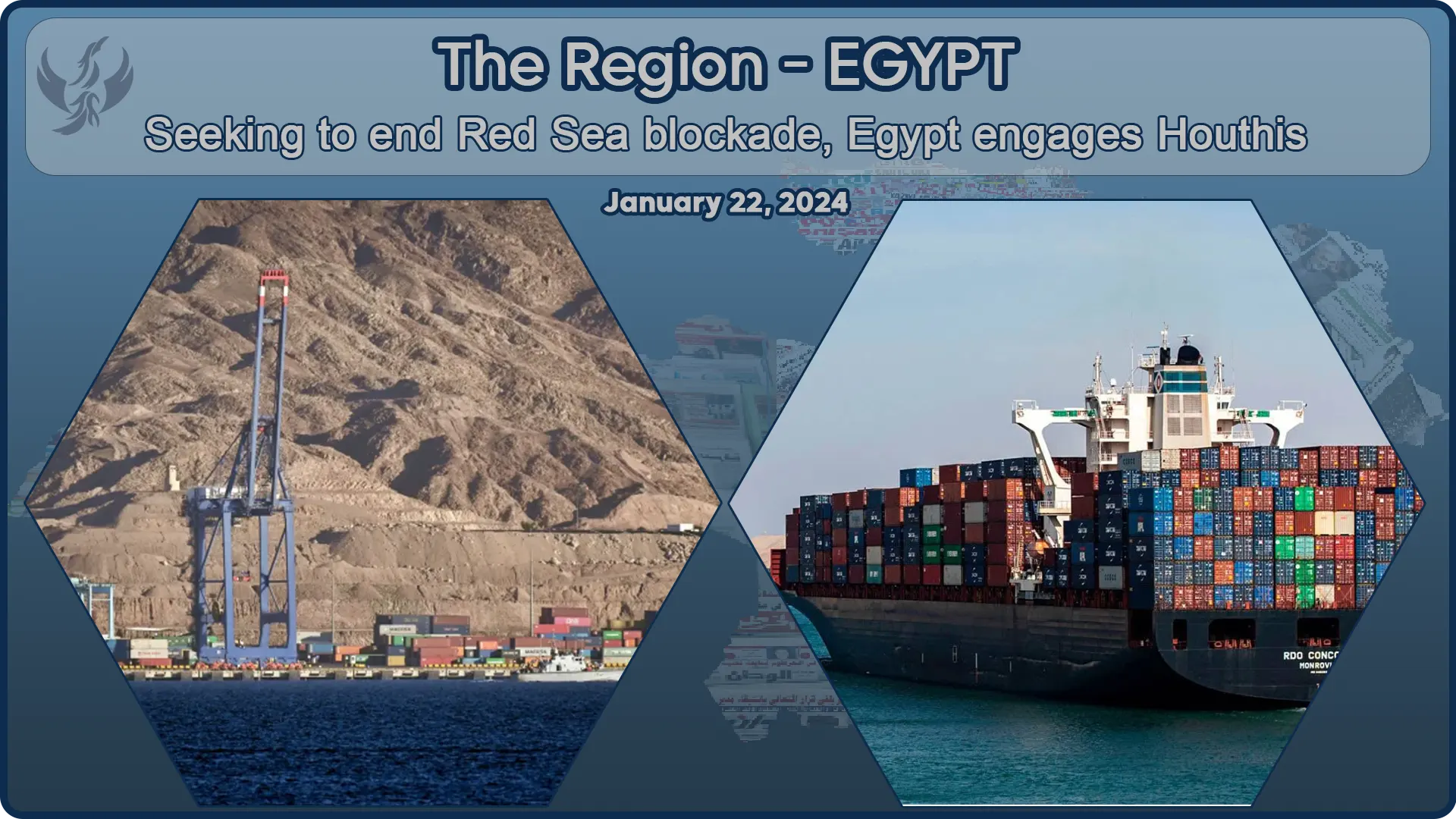 Seeking to end Red Sea blockade, Egypt engages Houthis. With Suez Canal traffic plummeting, Egypt opened a high-profile dialogue with Houthi leaders aiming to de-escalate tensions in the Red Sea and restore normal shipping on the strategically vital maritime route. Though grounded in traditional conflict resolution tactics, this Egyptian approach is unlikely to work. In the context of Arab politics and tradition, the Houthis will perceive Egypt’s outreach as a sign of capitulation and of fear and weakness on Cairo’s part–and as a sign that the Houthis’ missile blackmail is working. Rather than defuse tensions, this perception is likely to embolden the Houthis to intensify their attacks until their broader demands, ostensibly linked to the situation in Gaza, are met.
Seeking to end Red Sea blockade, Egypt engages Houthis. With Suez Canal traffic plummeting, Egypt opened a high-profile dialogue with Houthi leaders aiming to de-escalate tensions in the Red Sea and restore normal shipping on the strategically vital maritime route. Though grounded in traditional conflict resolution tactics, this Egyptian approach is unlikely to work. In the context of Arab politics and tradition, the Houthis will perceive Egypt’s outreach as a sign of capitulation and of fear and weakness on Cairo’s part–and as a sign that the Houthis’ missile blackmail is working. Rather than defuse tensions, this perception is likely to embolden the Houthis to intensify their attacks until their broader demands, ostensibly linked to the situation in Gaza, are met.
However, Egypt’s outreach is fatally undermined by another dynamic: that the Houthis are acting as executors of the Iranian Supreme Leader’s broader regional strategy, with much larger goals than whatever local concessions Egypt might be able to deliver to the Houthis. To be effective, Egypt’s response will have to be more assertive. Instead of implicitly validating the Houthis’ pretext that their Red Sea attacks are meant to serve the Gaza cause, Egypt will have to warn that continued actions that destabilize the region’s economy, including Egypt’s own, will lead to the imposition of costs not just against the Houthis, but against the Iranian regime that is backing the Houthis’ aggressive tactics. Cairo’s real conversation, therefore, will ultimately have to be directed to Khamenei himself, if Egypt is to effectively address the root cause of the escalation.
=====================
📌 Incase you missed it,
📰 The Early Phoenix January 19, 2024
📰 The Early Phoenix January 18, 2024
📰 The Early Phoenix January 16, 17, 2024
=====================
Follow the latest news from the American Center for Levant Studies via Google News

